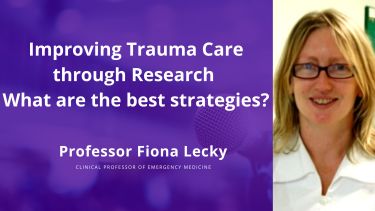Abstract
Injury – an alteration of body function or other evidence of pathology – occurring as a result of an external force - is a unique global disease in two aspects. Firstly it can impact any organ or structure in the body as an isolated or multiple injury scenario. Second it has been a global pandemic throughout human history killing more people than COVID-19 throughout the pandemic years.
There are many challenges to conducting research in such an unpredictable disease, randomised trials – even drugs are largely a failed strategy and pharma are currently disengaged. However comparative effectiveness research designs using trauma registries, particularly for identifying effective systems of care have had the most impact on changing practice and improving outcomes. During the lecture examples will be given of randomised trials and comparative effectiveness strategies in major injury highlighting the strengths and weaknesses of both approaches.
∫˘¬´”∞“µ the speaker
Professor Fiona Lecky is Clinical Professor in Emergency Medicine at the Centre for Urgent and Emergency Care Research (CURE) within the ∫˘¬´”∞“µ Centre for Health and Related Research (SCHARR), and a Honorary Consultant in Emergency Medicine at Salford Royal Hospital. Fiona holds an Honorary Chair as Research Director of the Trauma Audit and Research Network (TARN) at the University of Manchester and Research Professor of the Humanitarian Conflict Response Institute (HCRI). She chaired the 2014 update of the NICE Head Injury Guideline and has been a member of the International Federation for Emergency Medicine Research Committee since 2010.
Fiona has a 60/40 commitment to her University and clinical roles. She supervises under and postgraduate research students and is a lead investigator in international multicentre trauma research initiatives which are her major research interest.

